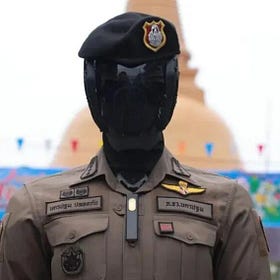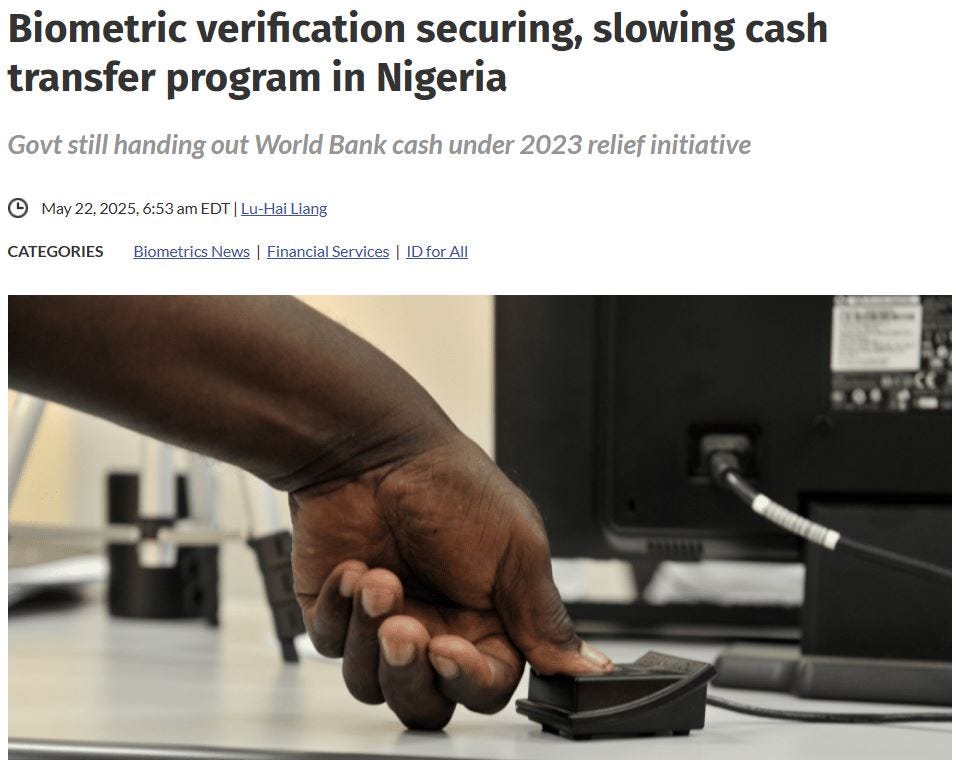Harvesting Your Biometrics: Part One
It's 'inclusive', it 'fights scammers', it assures 'legal rights', and if you believe all that then you will believe anything.
Let us revisit the biometrics and surveillance juggernaut in headlines, to see if we can spot the propaganda angles- the bait and the hook. We have explored different aspects of these agendas. I invite readers old and new to visit or recap on the acceleration of digital ID and surveillance, through the lens of reversed values and trojan horse methodologies:
The Reversal of Normal Values
I write this article for posterity - as a historical preservation of the most significant intersecting events of our time preceding digital gulags, for I know that the timelines might all be scrubbed clean and memory holed, eventually...
Technocratic Thailand Roundup
I will preface this roundup by reminding readers that the overwhelming majority of Bangkok’s visible population are walking around like zombies staring at their phones. In the parks, most people just want to find a quiet spot in beautiful nature, to spend quality time with their phones. It is getting more difficult to use cash as vendors rarely have cha…
Here is a rundown of the headlines I’ve been collecting since…

This one is a classic. When a research team is said to be concerned about the - surprise-surprise - hackable element or critical security flaw within the new technology created to “keep you safe” - when such a problem would not exist without forcing the adoption of these new verification methods.
Quoting from the article above.
The bait:
Biometric template security is critical to the data integrity and privacy the industry needs to thrive.
The hook:
These better (for the attacker) results are achieved with relatively limited computing power for both adapter training and the face reconstruction attack.
The solution is hinted at as feeding the AI models more data in the form of your face to ‘train on’.
Banks in Thailand require ‘face scanning’ for bank transfers over 50,000 THB. Now a hacker could potentially recreate your facial template with AI. That’s if a physical in person attacker doesn’t use your own phone’s banking app to scan your face as you lay unconscious or as a corpse.
Two factor authentication methods using an opensource 2FA app like ‘andOTP’ (*not google authenticator!) or a physical Yubi key are secure enough - but the technocrats don’t want you using those, because they negate the ‘need’ to obtain your biometric data for storing on databases, building your social credit score, and interlinking with CCTV live facial recognition technology.
Always remember, this global push for obtaining and harvesting YOUR biometric data, is solely for the purpose of building the panopticon control grid. They will keep pushing the envelope as they tell you, oops, sorry, it’s not secure enough yet. Now we need you to scan your iris too - it will prevent (cause?) fraud and fight crime, honest. Then eventually they will try to get blood samples for all kinds of access control points, to verify a user’s identity. Right out of that vintage nineties documentary movie…
The legal filing comes from privacy rights group Big Brother Watch, which argues that Asda’s use of LFR cameras is “unlawful.” Filed with the Information Commissioner, the legal complaint claims Asda is “infringing the data rights” of shoppers and exhorts the end of the use of the biometric technology by the supermarket chain.
Kudos to Big Brother Watch in the UK for challenging Asda’s foray into technocracy here. Big Brother Watch has also challenged Police Scotland over their use of LFR. The Biometric Update site is clearly run by technocrat advocates - ever more apparent when out of all the organisations cited in the above article, Big Brother Watch was the only one not hyperlinked - they don’t want readers to delve too deeply into the counterpoint:

We digress.
Back to Asda and its management’s desire to overreach surveillance on steroids…
The bait:
The trial is designed to increase security amid a rise in retail crime. The retailer says it recorded approximately 1,400 assaults on its staff last year. The installation scans images of shoppers against a watchlist of previous offenders compiled by Asda. If there is no match, the images and the biometric templates collected are deleted immediately and permanently.
See it? Sympathise? We all need to be treated like could-be / would-be / criminals, for the greater good, apparently. Never mind the old ways revolving around security awareness training for staff on how to spot suspicious persons, when to escalate, and how to intervene. The cucked supermarket security farce has gone from allowing shoplifters to blatantly shoplift without fear of intervention or prosecution, to now outsourcing security entirely to CCTV video analytics out of a perceived, manufactured necessity.
The hook:
A new report from the Identity Theft Resource Center (ITRC) also explored consumer attitudes toward biometrics, throwing light on the growing reliance on biometric technologies and the skepticism many consumers still hold toward them.
While biometric technology cannot eliminate identity fraud entirely, the report says, its appropriate and ethical use can significantly reduce the risks posed by static, compromised data.
Ethical use?! What a joke.
We might need to prepare one of these little beauties for the go-bag soon.👇
[Hyper realistic silicone mask]
The technocrats hate cash. It’s fungible, anonymous, there is no third party, and people can use it to transact peer to peer. Now we see a push to force a middleman between the cash recipient and the state, to fuse the digital with the physical. Major strings attached. Those ruthless bastards.
The bait:
It comes as the World Bank expressed concern over the slow roll-out of the cash transfer program, which launched in 2023 following the removal of the petrol subsidy and unification of the foreign exchange market.
Ah, the world bank. That loving, caring, altruistic, benevolent entity. Right guys? They lament that the cash transfer program is just too slow. Why is that? It is slow because of forcing people to have their biometrics harvested in order to receive the cash. What problem does this solve? Sometimes the hook can come in the form of a thinly veiled threat:
In an interview with Arise TV, special adviser to President Tinubu on economic affairs, Tope Fasua, said biometric validation was needed to prevent fraud and for transparency but suggested that it contributed to the slow progress.
“The reason why only 37 percent of households have been reached is because of the need to have biometric confirmation,” he said, adding that the process will be “tidied up” going forward.
No fingerprints, no cash. No cash, no food. They always say it’s to prevent fraud and for transparency. Yet, those very characteristics they fawn over, often end up being manipulated by bad actors, thus wrecking the people whose data has been collected.
Case in point - hailing from the know-your-customer (KYC) industrial complex - just ask the crypto bros who have been cleared out after Coinbase got hacked for information on users including crypto balances and physical addresses!
Check back in next week for part two, in which we shall examine the palpable desperation which is self evident amongst the technocratic minions and useful idiots, as they attempt to sell us on the idea of digital ID and ‘inclusiveness’ for banking the unbanked - what about the rampant, politically weaponised and ideologically motivated debanking of dissidents?!
Nicholas Creed is a Bangkok based writer. If you donate a virtual coffee or crypto, it would help to keep the lights on.
Email: nicholas.creed@protonmail.com with information and newsworthy stories for open source intelligence gathering to support this Substack, thank you.
Bitcoin address:
bc1p0eujhumczzeh06t40fn9lz6n6z72c5zrcy0are25dhwk7kew8hwq2tmyqj
Monero address:
86nUmkrzChrCS4v5j6g3dtWy6RZAAazfCPsC8QLt7cEndNhMpouzabBXFvhTVFH3u3UsA1yTCkDvwRyGQNnK74Q2AoJs6











You know what would cut back on identity theft? Real penalties for the sub-human trash that commit it. Like involving a car battery, since they're so big on using electricity for fun. But who pays, as usual, for the crimes of a few? Everyone else. Twice. Some piece of shit steals your stuff and it's *you* that gets put in a cage, not the POS. It's almost like governments create and allow criminals in order to have a reason to restrain the people who *aren't* criminals. Problem, reaction, solution. And while everyone buys into that and clamors for "safety," almost none of them notice that a criminal who knows your credit card number is nowhere near as dangerous as a government that knows that and everything else about you.
Good work, Nicholas - thank you!
The awful thing here in the UK is that the supermarkets tell us that they cannot apprehend shoplifters (and the police won't bother either) so the public is witnessing and having to pay for crime. And we know this reticence is an excuse to bring in facial recognition tech so that they can rid themselves of shop staff eventually and reduce police in favour of tech. And the immensely troubling aspect of that is the absence of an appeal system when AI goes wrong or is inadequate.
I look forward to the next episode.